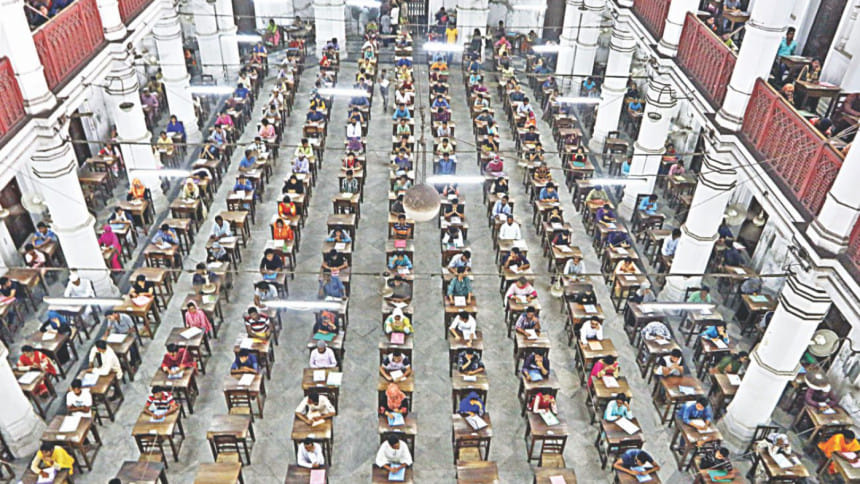To go or not to go online?

As my students entered the exam hall, their faces were a tad bit more tense than usual. I was nervous myself. I would finally find out whether our efforts to make the course different had been a whopping failure. It was the midterm of our Research Methodology course and these 14 students were our acid tests. I had gone into teaching the course with much excitement and thanks to my co-teacher, we were able to make the changes we wanted. In our education system, even at the university level, memorisation and cramming are, sadly, still the most popular learning strategies. We wanted students to think and learn by thinking. We designed our course in such a way that we would be able to encourage creativity, originality and interactive classes. It was a challenge. I was uncertain how the students would respond and whether this would actually enable them to learn better. Above all, I wanted to get the students to love learning.
As Covid-19 forces us to contemplate university education in terms of online classes and session jams, this may be an eye-opening opportunity for us to strive to improve our education system. While the lack of infrastructure and resources may be an impediment to mobilising online teaching as an alternate route, what worries me more is whether we have the intellectual capacity to make the shift. I find the most pertinent question to be whether how we teach—and how our students learn—is compatible with the change.
When I'd planned that the exam question paper for my course would be case study based so that students would have to think and wouldn't be able to "vomit" their memorised answers onto the answer scripts, I knew that it was my responsibility to train the students for this approach. I couldn't impose a different style of assessment on them without preparing them for it. I had to first learn the right pedagogy and apply it in contrast to the usual pedagogy I myself had been used to as a student.
For online classes, we need to be prepared with much more than just laptops and internet access. Firstly, the online modality would have to be substantially different from the spoon-feeding pedagogy that we are accustomed to if we want students to really learn. However, this is true for offline classes as well. How well do our students really learn anyway? How can they if memorisation is their dominant study strategy? If we are to aim for better learning, I believe that the most effective strategy is to simply change the exam question formats. Teachers providing references and reading materials, and students looking up those references and reading on their own time would matter more, because students would have to rely on really learning to pass and excel.
For example, in open book exams, the exam question structures make the students think. That should be the ultimate goal—to make students think, to teach them how to think. To make online classes a success, there is really no alternative to drastically changing our assessment format. In the existing format, students could easily copy their answers onto their online answer scripts because the questions are often simply too direct. Giving students assignments as an alternative to exams also has its own problems—plagiarism to begin with.
Sadly, due to our school and college education system having their own flaws, there is perhaps also a lacking in students' skills—simply writing two paragraphs in English on their own may be a struggle for many. Before we enforce a new system, we need to ask ourselves whether the students—-all of them, regardless of their backgrounds—have the capacity to adapt to it. We need to teach our students in such a way that they can answer applied questions and not just memorise the definitions. We need to figure out how to keep students motivated because their enthusiasm is important in ascertaining that they absorb what they learn.
Of course, we would need preparations for such a shift. Just from my experience, I can promise that it takes a lot of effort. As the teacher, I had to read twice—maybe even thrice—as much as my students. It was worth it though, especially because the students stepped up to the challenge. They convinced me that students will respond well if we give them the right opportunity, platform and lessons to do so. A very crucial point—a confession if you may—is that class size matters. We were able to implement the changes because we had a manageable class size. For larger class sizes, the struggle is much harder; not impossible, just extremely demanding. There may also be variations to the feasibility of such a shift across different subjects—across different institutions even. Sadly, there is much variation in both infrastructural and intellectual capacity. Such variation, especially across students of different socioeconomic backgrounds, is why it is difficult to design an educational policy that will not harm a particular group. Closing the divide caused by this variation should be a topmost priority.
For students who were at the end of their programmes and about to graduate soon, there is the matter of whether a delay will cause them harm in the job market and in higher studies. In our system, their CGPAs are as important as sugar levels are to a diabetic patient. There has been much chaos over how to assign grades already. If we put the learning factor aside, the purpose of a grade is to act as a signal in the job market. What to do? The fairness of relying on past grades may be questioned.
Another option is to go for universal pass/fail grading. But how do we decide when to fail a student? Should we then, in the light of the current pandemic, just let all students pass? There is a possibility that someone undeserving may get a pass when they would have normally gotten a fail. As a result of passing everyone, the system loses its opportunity to use CGPAs and grades as filters. In such a case, the intervention would have to come from the job market. Employers would have to devise new and innovative filtering systems when they recruit from this student pool. I believe that such a change is needed anyway because relying on grades—in the current state of education in this country—to assess quality is faulty.
To identify alternatives, there is no substitute to rigorous quality research in the field of education. There is an immense lack of educational data in Bangladesh. We need research to be able to inform evidence-based policymaking. Otherwise, it will continue to be speculations, trial and errors. How long can we afford to shine the spotlight on a stage where "development" dances while the education system crumbles beneath?
Rubaiya Murshed is Lecturer at the Department of Economics, University of Dhaka.

 For all latest news, follow The Daily Star's Google News channel.
For all latest news, follow The Daily Star's Google News channel. 



Comments